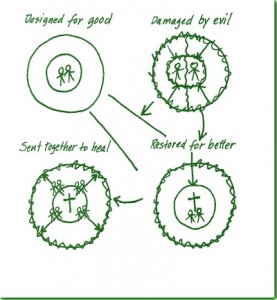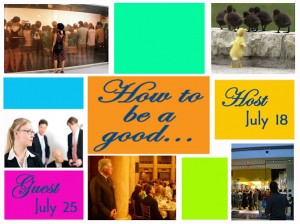Stuff My Church Does – Bring *
Sycamore Creek & Potterville UMC
September 2016
Tom Arthur
Peace friends!
What’s your experience coming to church? Are you like me? I grew up doing church. My mom brought me every week. But when I got to be a teenager someone invited me to youth group. It was maybe the first time I had gone to church without my mom. This whole faith thing started to get real. I came the first time because someone invited me. I came back the second time because there were cute girls at youth group! (Admit it: how many of you guys stayed in church because of a cute girl?) Well, I’m exaggerating a little bit, but not by much. I not only found cute girls at church, but I also stayed because I found something deeper in the people around me. These other teenagers who were all in for Jesus seemed to have found something I was looking for. Found people find people.
Today we’re continuing in the series Stuff My Church Does. We’ve been looking at the why behind the stuff we do. We began with discipleship, looked at music the second week and prayer the third week. Today we’re looking at why we bring people to church.
Here’s the whole point of today. If you get nothing else out of this message take this away:
The Point: People bring people to Jesus.
The person we are today has more to do with the “who’s” than the “what’s” of our life. This is true about the church too. We connect and stay because of someone. We are involved because of someone. The church can have all kinds of great ministries, events, etc. but none of them bring people to Jesus. People bring people to Jesus. The Church is the only organization whose purpose is for those who aren’t here yet.
How did you end up coming to Sycamore Creek (or any church or organization you’re a part of)?
The current American church is having an identity crisis. Lifeway Research, an arm of the Baptist church, found that only 2% of people who regularly attend church will invite someone outside the church in a year (98% don’t invite someone to church)! So that’s the Baptists. How bout we Methodists? I recently read that a United Methodist invites someone once every 38 years (Get Their Name)! Consider those statistics in light of other research that shows that 7 of 10 unchurched people have never once been invited to get involved in church in their entire life and 51% of people would be likely to come if someone invited them. Maybe we should say, “’Bring’ is the stuff the church doesn’t do!” We’ve hidden our light under a bowl.
Today I’d like to re-inspire us to bring people to church by looking at one of Jesus’ early friends, Andrew. Andrew is always bringing someone to Jesus. He brings Simon. He brings a boy with fish. He brings curious Greeks during Passover. How and why was Andrew always bringing someone to Jesus? I think there are two reasons Andrew was such a bringer.
- Andrew Maintained a Sense of Awe and Wonder
Andrew is the disciple always elbowing the other disciples whispering, “It’s Jesus! Check this out!” Let’s look at one story where this happens. John is one of Jesus’ three closest friends and he tells the story of Jesus miraculously feeding thousands of people.
After this Jesus went to the other side of the Sea of Galilee, also called the Sea of Tiberias.[a] A large crowd kept following him, because they saw the signs that he was doing for the sick. Jesus went up the mountain and sat down there with his disciples.
~John 6:1-3 NRSV
Notice that Jesus is focusing here not so much on the crowd as he is on his inner circle of disciples. And yet the needs of the crowd are going to have an impact on and become a teaching point for the disciples.
Now the Passover, the festival of the Jews, was near. When he looked up and saw a large crowd coming toward him, Jesus said to Philip, “Where are we to buy bread for these people to eat?” He said this to test him, for he himself knew what he was going to do. Philip answered him, “Six months’ wages[b] would not buy enough bread for each of them to get a little.”
~John 6:4-7 NRSV
John tells us that a crowd of pilgrims are there for the Passover. This means that they’ve traveled far away from home for the Passover. The Passover is the time when the Jews celebrated their deliverance from slavery in Egypt. And now that they’ve traveled this far they’re all hungry. Most of the disciples are very pragmatic about the situation. But Andrew has a slightly different response. He brings someone to Jesus.
One of his disciples, Andrew, Simon Peter’s brother, said to him, “There is a boy here who has five barley loaves and two fish. But what are they among so many people?” Jesus said, “Make the people sit down.” Now there was a great deal of grass in the place; so they[c] sat down, about five thousand in all.
~John 6:8-10 NRSV
When John reports that there are “five thousand in all” he doesn’t really mean that the way we would today. What he means is that there were five thousand men. That means there were more than twice that amount when you include women and children. And Andrew is suggesting that a boy with five loaves and two fish might somehow be part of the solution even if it all seems impossible! I’m guessing the disciples were thinking Andrew must be some kind of idiot! But what kind of idiot? The kind of idiot who has a big vision of Jesus. It’s Andrew’s awe and wonder and passion that keeps driving him.
Then Jesus took the loaves, and when he had given thanks, he distributed them to those who were seated; so also the fish, as much as they wanted. When they were satisfied, he told his disciples, “Gather up the fragments left over, so that nothing may be lost. So they gathered them up, and from the fragments of the five barley loaves, left by those who had eaten, they filled twelve baskets.
~John 6:11-13 NRSV
Jesus recognizes the opportunity to teach the disciples about who he is through this boy that Andrew has brought him. He does the miraculous and feeds them all with a lot left over! It all begins with Andrew bringing the boy to Jesus. And Andrew brings the boy to Jesus because he’s passionate about Jesus.
We talk about what we’re passionate about. Our heart and mouth are closely related. Jesus teaches that “it is out of the abundance of the heart that the mouth speaks.” (Luke 6:45). Whatever has a hold of your heart comes out of your mouth. If you’re passionate about Green and White then you talk about the Spartans. If you’re passionate about Blue and Gold then you talk about the Wolverines. But if you want to mix the two together then you talk about Blue and White! Go Blue Devils!
One of the things I’ve been really passionate about over the last couple of years is balance bikes. A balance bike is a bike that kids learn to balance on. It doesn’t have pedals. So they learn at their own pace slowly learning to glide more and more. Both of my boys have used one to learn without having the painful experience of all that falling down stuff. I started a community balance bike group, and I’m always telling people with little kids about balance bikes. I’m passionate about it so I talk about it. Could it be that our reluctance about bringing people to Jesus is because something else has laid hold of our hearts and our passion and has captivated us?
For many of us there is a lot of time and distance between when we first met Jesus and today. Familiarity breeds contempt (the more familiar you are the less passionate you are about it). Somewhere along the way we’ve forgotten how good the news is. We lost our first love. We lost our awe and wonder about Jesus. What was Andrew’s secret for maintaining awe and wonder? I think it may have been in the way that Jesus initially called Andrew to follow him.
As Jesus passed along the Sea of Galilee, he saw Simon and his brother Andrew casting a net into the sea—for they were fishermen. And Jesus said to them, “Follow me and I will make you fish for people.” And immediately they left their nets and followed him.
~Mark 1:16-18 NRSV
Have you ever wondered why the disciples were so quick to follow Jesus? Was Jesus some kind of a Jedi? “At first it seems a little fishy.” (Ugh…I know.) Why were they so easily persuaded? Well, first of all, this was likely not their first encounter with Jesus (read John 1). But more so, in first century Israel culture everyone wanted to be a Rabbi, not a rock star, sports star or reality TV celebrity. Every six-year-old boy started off on the path to become a rabbi. There were three stages of training (for more on this check out this article by Ray Vander Laan). At some point if you didn’t have the right stuff, you’d be sent home to learn your family trade. If you had what it takes, you might ask to follow a rabbi. But some extraordinary rabbis would choose their own students. “Come follow me.”
Andrew is fishing, which means he’s taking up the family trade. He wasn’t good enough during the three stages of training to be a rabbi. He didn’t have what it takes. So he’s gone back to the family business of fishing. And along comes this rabbi, an extraordinary one at that, and he picks Andrew! Andrew lived in close proximity to the grace offered by Jesus. Jesus picked Andrew when others wouldn’t. Jesus picks us when no one else would.
Most of us are stuck in an old Janet Jackson song: What have you done for me lately? But maybe we should be grateful for what Jesus has already done for us. If God didn’t ever do another good thing for you, what he has already done for us in Christ is infinitely more than we deserve. If we’re going to maintain a sense of awe and wonder we’ll have to be in the habit of continually reminding ourselves what Jesus has done for us.
How did Jesus rescue you? Many of us don’t have a big rescue story. Andrew didn’t really either. He was rescued from the family business of fishing. But Jesus brought reality to the deepest longing and desires of Andrew’s heart, not because he had a really messed up life. Perhaps Andrew felt disappointed about doing what his family had done for centuries, and Jesus introduces Andrew to a purpose and cause bigger than himself.
Here’s a good question to cultivate some awe and wonder: What mess would I be living in if Jesus hadn’t rescued me? Or who would I be if Jesus hadn’t called me? What kind of spouse? Father? Mother? Friend? Worker? Son? Daughter? Jesus not only rescues us, but he brings reality to the deepest longing in our hearts. This is good news! We can’t help but share it with others. We need to be in the habit of reminding ourselves just how GOOD this GOOD news is. This is the secret to how Andrew maintained a sense of awe and wonder.
- Andrew Chose Compassion over Convenience
Andrew’s awe and wonder also showed itself in his profound awareness of other people’s needs. After initially encountering Jesus, Andrew wants to go immediately to find Simon. He wants to share this compassion with others around him. In the story we read above the disciples want convenience, but Andrew wanted to try something new. Our compassion creates encounters for others with Jesus.
A couple of months ago we did a very popular series called The Art of Neighboring. We handed out fridge magnets and challenged you to get to know the names of your eight closest neighbors. We asked, “What if Jesus meant for us to love our actual neighbors.” How’s that going? Knowing your neighbors’ names is one simple step of showing compassion. We hosted a neighborhood BBQ at our house and had about twenty neighbors over. We got to know their names and even more about them. We had a lot going on this summer: launching a Church in a Pub, exploring adopting Potterville UMC, vacations, and more. But we made time to show our neighbors a little compassion even though it wasn’t necessarily very convenient. What is your home? Is it a fortress away from the world or is it a hospital for the world? Is it where you keep all your appliances of convenience or is it where you show your neighbors compassion?
Choosing compassion over convenience means showing compassion to the person you work with who drives you nuts, the family member everyone has given up on, or the strangers you work out next to at the gym.
Andrew didn’t wait for someone else to do something, He went and brought people to Jesus.
Imagine if he hadn’t brought Simon or the boy with five loaves and two fish to Jesus? What if the person who brought you to Jesus hadn’t done so?
As we live into owning a building it will be tempting for us to forget that the Church is not a building. It’s a community of people. When people ask, “Why won’t the church do this or that?” I think, “Good question: you are the church. Why don’t you do that?!” We’ve got a cool-slowly-being-remodeled building and a cool sign out front, but buildings and signs don’t bring people to Jesus. People showing compassion bring people to Jesus.
This fall God is beginning something new at Sycamore Creek. We’re doing a church-wide campaign called Simplify. We’re trying to show some compassion to the overworked, overscheduled, and exhausted people in our culture. Here’s a basic question: How will they get here? How will they know about this good news? The answer is: You’re the invitation. Will you commit to Invest & Invite three people to Sycamore Creek this fall? It’s stuff my church does: bring people to meet Jesus.
Next Steps
- Journal about what God is doing for you
- Daily pray for five minutes about this fall (Church in a Pub, Potterville, Simplify)
- Sign up for a small group through GroupLINK
- Invest & Invite three people
* This sermon is based on a sermon first preached by Nick Cuningham









Recent Comments